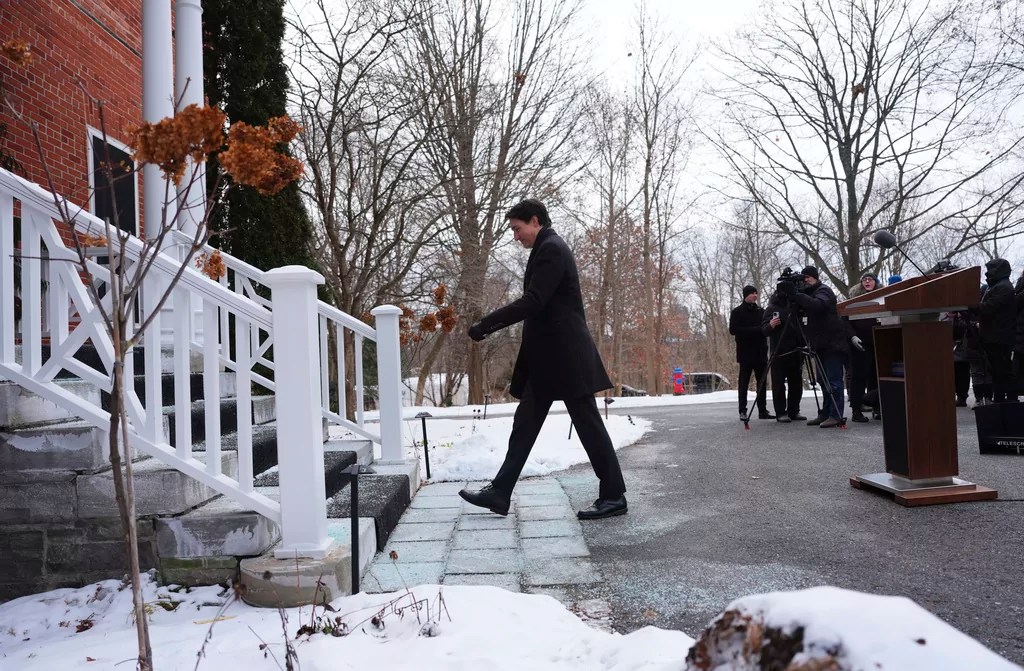Canadian Prime Minister Justin Trudeau is stepping down from his role as head of the nation’s government.
Trudeau announced his decision on Monday at a press conference outside his residence at Rideau Cottage in Ottawa, Ontario.
“I intend to resign as party leader, as prime minister, after the party selects its next leader through a robust nationwide, competitive process,” Trudeau told reporters.

The prime minister announced that parliament will be prorogued until March 24 as the Liberal Party seeks a new leader.
Trudeau has led the Liberal Party for 11 years and served as prime minister for nine. He told reporters that he was driven to this decision by paralysis in the parliament that has made constructive action impossible.
“As you know, I’m a fighter. Every bone in my body has always told me to fight because I care deeply about Canadians,” the prime minister said at the press conference. “I care deeply about this country, and I will always be motivated by what is in the best interest of Canadians.”
Trudeau’s resignation will leave a power vacuum at the helm of the Liberal Party, which is expected to be bulldozed by its rival Conservative Party in the October parliamentary elections.
The decision to step down is hardly a surprise — the prime minister has been plagued by a collapse of support from inside and outside his party over the last several months.

Most prominently, Deputy Prime Minister and Finance Minister Chrystia Freeland resigned from her posts in December.
She characterized her decision as an act of protest against the government’s penchant for “political gimmicks” while failing to address the threat of staggering tariffs from the United States under the next administration.
During his resignation speech, Trudeau expressed a sense of regret that Freeland did not stay on as deputy minister and help overcome the obstacles facing Canada.
“Chrystia has been by my side for close to 10 years now. She has been an incredible political partner through just about everything we have done as a government and as a party over the past decade,” Trudeau said.
“I’d really hoped that she would agree to continue as my deputy prime minister and take on one of the most important files that not just this government, but this country is facing — but she chose otherwise,” he continued.
Freeland is considered a contender for replacing Trudeau, with many Liberals seeing her as an accomplished insider with a clearer vision for the future than her former boss.
Trudeau refused on Monday to reveal the nature of their discussions that led to her resignation in protest.
“In regards to what actually happened, I am not someone who is in the habit of sharing private conversations,” he said.
President-elect Donald Trump has made clear to the Canadian government that he intends to push harsh renegotiations on trade between the two North American countries when he enters office later this month. He specifically threatened a 25% tariff on Canadian goods if the country does not work to secure its border against drug trafficking and illegal migration.
Polls show the Conservative Party holds approximately 44% of the vote in a hypothetical election, against the Liberal Party’s 20.9%.
CLICK HERE TO READ MORE FROM THE WASHINGTON EXAMINER
Conservative leader Pierre Poilievre, widely believed to be a shoo-in for the prime minister’s office in October, has lambasted the Liberal Party’s past several months of floundering.
“Forty-one million [Canadian citizens] are not obliged to wait around while this party sorts out its s***,” the Conservative leader said in an interview released Friday. “Like, these guys could have got rid of Trudeau a year and a half ago.”
